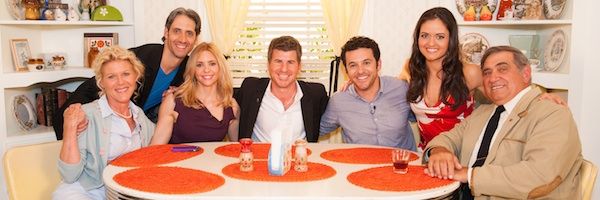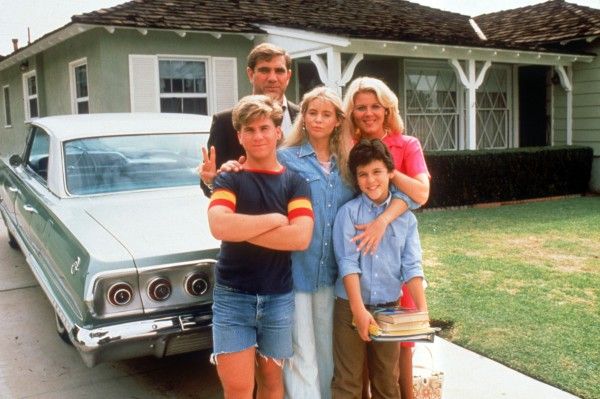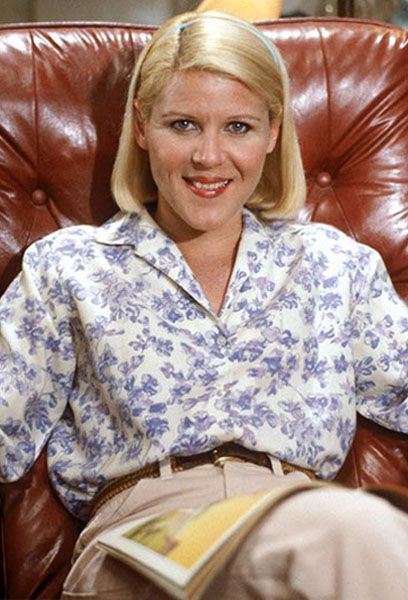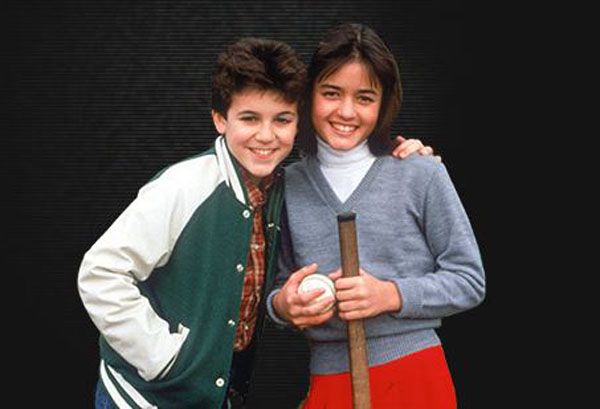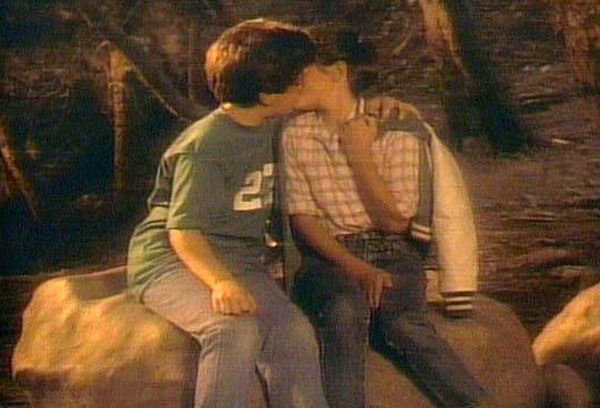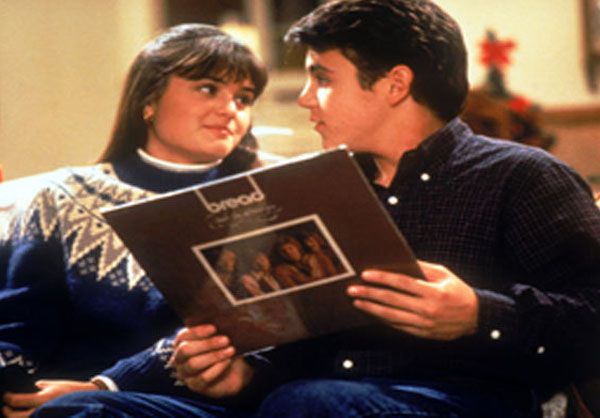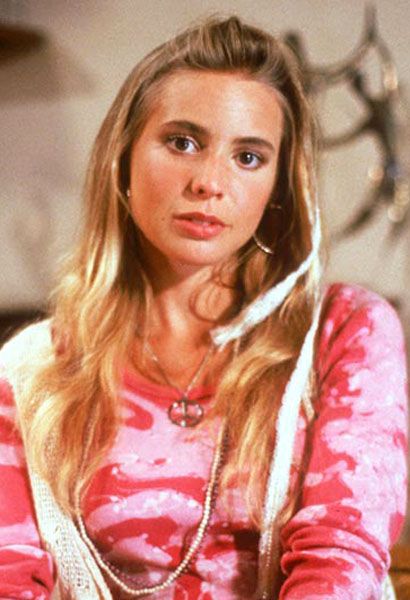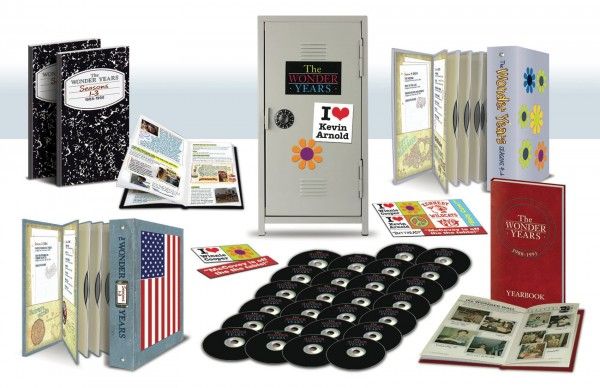Never before released on DVD, The Wonder Years captured the angst of growing up in suburban middle-class America in the late ‘60s, as seen through the life and times of Kevin Arnold (Fred Savage). The cast recently got together for a reunion, which was taped to be included in the over 23 hours of exclusive bonus features on the six season, 26-disc, 115-episode box set.
During this recent interview to discuss The Wonder Years and what their time on it meant to them, co-stars Danica McKellar (“Winnie Cooper”), Olivia d’Abo (“Karen Arnold”) and Alley Mills (“Norma Arnold”) talked about how important the time period was to the show, how much they’ve missed these characters, why this was a life-changing job for them, why they think the show has had a sustaining popularity, what they learned about themselves from having been a part of the show, the bonus features on the DVD, and how time has affected their perspective of their time on the show. Check out what they had to say after the jump.
Question: With the series set in the ‘60s, what did that add to the experience, as opposed to doing a show set in the ‘80s? Did you learn anything about the ‘60s through the experience?
ALLEY MILLS: That was when I was in high school. I had a great honor of teaching all of it to Olivia [d’Abo], who was the big hippie, and even though her father was a rock and roll guy, she didn’t really know the joy and the hope and the incredible energy behind the movement of the ‘60s. I think the whole point of the period was that this was the beginning of the end of wonder. The whole series began with the introduction of the Vietnam War into our little TV in the kitchen, and it was at that very time that the whole country began to feel the pain of the war and the ramifications of that whole joyous movement. So, I think that the period was everything about our show, and that was, for me, what gave it all the beauty.
DANICA McKELLAR: And from my perspective, my character was almost acting independent of the time period, except for the wardrobe. What I thought was the meaning of the show was that it paralleled with a few things going on in the world, and then there was what seemed like huge things going on to a couple of kids. Their whole life revolved around whether or not they were about to have their first kiss. Of course, Winnie Cooper’s brother died in Vietnam, in the beginning of the show, but he could have died from anything. It was just about the loss. There are very universal things that happen in any time period, which is why I think people can relate to the show, even if they didn’t experience the ‘60s. I didn’t have to know very much about the ‘60s. My character interacted with school, and interacted with Kevin Arnold and Paul Pfeiffer, and dealt with things that are absolutely universal, like does this guy like me or not? Am I popular? Am I doing well in school? It was about all of those things. My parents, in the show, separated. Things like that happen, at any time.
OLIVIA D’ABO: To this day, everybody I know, including myself, feels like the ‘60s was the most pivotal and just incredibly exciting, electric time that we’ve had, probably compared to the Renaissance. My character was a teenager. She was burst into this incredible time where she was experiencing free love, and tuning in and tuning out, and being very politically pro-active, in terms of being anti-Vietnam. I was really amazed to learn as much as I could, in a very short amount of time, about the period. I studied. Luckily, I was able to watch it on video with The Fabulous ‘60s, which basically covered every year that transpired between 1960 and 1970. I really got a very thorough education, and I spent an entire summer with an acting coach of mine, at the time, at the Actor’s Center, and I just studied. It was like going to college for the ‘60s. And then, I read Letters to Vietnam, which is incredibly moving. It was a really palpable experience for me. Actors are very sensitive and very emotionally connected to stuff that they are playing, if they are passionate about it. So, I just digested it and jumped right in, and immersed myself in music that Alley was kind enough to give me. She was a huge anchor for me, by the time I met her and got on set, because she was actually a lot like Karen was. It was just great to have that camaraderie to shoot things off with, in terms of being able to say, “Am I off here? Am I in the right zone?” We had some improvisational stuff, within the first season, where there were no words, but the camera was on Fred and there was Daniel Stern’s narration. Those were some really pivotal times, where we got the times to explore terrain that was without words, but very much about the vibe of the period and the emotion behind it. There was an episode when Karen disappears and goes to Woodstock and the car breaks down. And there was a scene between myself, Alley, Dan [Lauria] and Fred [Savage]. Kevin is watching and getting to know Karen a little bit better, and he’s seeing a very different side of her. It was beautiful that those kinds of things were able to be explored without dialogue. Our characters were so developed and established, by that stage, and we all loved each other so much and worked so well off each other that we just let it rip and worked with the local osmosis between each other.
Have you guys missed these characters?
D’ABO: We do, every day. It’s a part of our DNA, at this stage. Yes, definitely.
McKELLAR: Well, every day somebody recognizes one of us on the street. We get to be that character, in some form. We get to see people’s looks on their faces. They’ll say, “Oh, my gosh, that show meant so much. My family watched it together.” We get to feel how special the experience was, over and over again.
Was this really a life-changing job for all of you?
McKELLAR: Yeah.
D’ABO: Yes. I think that every actor’s dream, and every artists’ dream. You want to be part of something that’s cyclical and that comes around every 20 years. That makes you feel like all of the hard work that you’ve been putting into your craft is actually paying off. Hopefully, you get into it to really have a purpose and put something out there in the world that’s going to resonate and be memorable and touch people and make them laugh. Luckily, I think we hit on all of those things with our show. It’s bitter sweet, but there was a lesson in every show that stuck with everybody. When you watch it today, it resonates even more because the world has changed, even since the ‘80s when we shot it, let alone the ‘60s.
McKELLAR: And now, nobody has to miss the characters because it’s coming out on DVD.
MILLS: I’m the oldest of the group, and once you’ve been around the block, you can see what things resonate and what things stick in the hearts of people, and nobody really knows what that magic ingredient was, but I always say it starts with writing and ends with writing, but it was also that we got to be a part of it. That was a great gift. It’s something that can touch every walk of life, every economic background, every color, and every nationality. It’s so rare that writing can do that. It’s like any great novel. It’s like Shakespeare in the theater. Those things last. We were luckier than anything to be a part of that. I am so thrilled that now my grandchildren will get to see it. I think the show is always going to have that human link that makes shows magic and makes people laugh.
To what do you attribute the ongoing popularity of the show? Have you watched the show yourselves, over the years?
McKELLAR: I haven’t watched it for awhile, to be honest. Although I did watch the first kiss recently because we had the outtakes for the first kiss from the pilot, and Fred and I had to give commentary on it. There were like six takes. But part of the reason why I think it’s lasted is the writing. Why did the show make such a splash? Why did it resonate so much in people? Why does it still matter? From my perspective, this was the first show that really honored the strength and emotions that kids have, at such a young age. Most TV shows, up until that point, were all about that parents, and the kids were there, too. This was the first show that had that narration. You got inside the mind and heart of a child, and I don’t think that it had been done yet. We all, when we’re little, have huge emotions, and the world doesn’t really honor them in the same way that they honor adults’ feelings because they’re just kids. You’re not in control of your own life yet. You can’t make your own decisions. “Oh, it’s puppy love. Buck up.” Well, we all have memory of those painful early years, and the elation in those early years. They’re huge feelings. Christmas morning is never the same to an adult as it is to a child. This show honored them and made them real and valid. I don’t think any other show had done that before, and we got to be a part of something that was ground-breaking and gave a new perspective for people on their own childhood. I think that’s why, for kids watching it, it mattered, and for adults watching it, it mattered. We’ve all been there.
MILLS: I think the fact that the format was in one half-hour, and a story was told that would make you laugh and, at the end, make you cry is another phenomenon that is why the show was so successful. It was like a little more morality tale, every single week, that transcended these barriers and could affect everybody, young and old. All walks of life were moved by this.
D’ABO: When this generation watches the show, and they love it as much as everybody else did, it can rewire their mind a little bit, to get through an actual scene and be moved by it, which is very rare. In the modern day world, that’s the thing that is really exciting and poignant and positive about it being re-released to this new generation of kids.
Danica, what did you learn from Kevin and Winnie’s relationship that helped you in your own relationships?
McKELLAR: Well, I had my first kiss on the show. I learned that things aren’t straight forward. Things aren’t black and white. In the second episode, Kevin and Winnie go back to the same place where they had their first kiss, but they don’t kiss. They get on the swings and act like little kids again, and he said something about progress not being a straight line, but that we have to swing back and forth a little bit. To be honest, I haven’t even seen the episode for probably 25 years, but I still remember that moment. It’s a beautiful and important message that relationships are not straight forward. They’re not black and white. Sometimes things don’t always going in a straight line, and that’s okay. Love can be very confusing. The show was told from the point of view of Kevin, so I also learned that women are fickle and not to be understood, which I though was a little strange since, to me, we make perfect sense. Kevin and Winnie’s relationship was, in some ways, defined by my friendship with Fred and some of the things that we would say. The writers would actually take lines from things that we were saying to each other, off camera, and put it into the script. There was this whole episode dedicated to, “Do you like him, or do you like him, like him?” That was an expression that he and I used when we were talking about some guy that I had a crush on, in real life. And then, it showed up in a script, a few weeks later. There were a lot of blurred lines. The other interesting thing was that I broke up with my first boyfriend, in real life, about a week before we shot the episode where I had to break up with Kevin on the show. It was fascinating how many parallels there were.
Have you watched the show with your fiancé?
McKELLAR: No, I have not watched the show with my fiancé. When we get the DVD box set, we’ll probably watch a bunch of the episodes.
Danica, is it true that you and your sister both auditioned for the role of Winnie Cooper?
McKELLAR: Yeah, in fact, we didn’t just both audition for the character of Winnie Cooper, but it came down to the two of us. I still remember that audition. We kept going in, and there were fewer and fewer girls in the room. We went back in again and there were three of us. And then, there were just the two of us. They told my mom, “Look, we’re gonna cast Danica because she’s a little older and there’s a kiss in it, but we love Crystal so much that we want to write a part for her, if this goes to series.” The other thing was that Winnie Cooper was not supposed to be a series regular, so we didn’t know that we are competing for a life-changing role. It was just a guest spot in the pilot. That was helpful because it wasn’t such a big deal. It was just a one-time guest role. And then, as it turned out, mid-way through shooting the pilot, they asked if I would sign a series contract, which was really exciting. By then, Crystal knew that they were going to be writing a part for her, and they did. She ended up doing nine episodes. She played Becky Slater, and it all worked out. She’s a lawyer now. She’s no longer acting, and I am, so it all worked out. She’s making all the money.
Throughout your years working on the show, is there anything that you were surprised to learn about yourselves, as actresses, that you’ve carried with you?
MILLS: For me, for sure. I had never played a housewife. I was shocked when they cast me as the mom. I was not married. I could not have children. I was Karen, in my youth. I was a hippie. In the business, I played tough, single women, up until that point. I’d done ten other series that hadn’t lasted like The Wonder Years, but I was always a rebel character. So, it was a great experience for me. I fell in love with this woman, whose priority was her family and not herself. I had always looked down on that. My mother was a feminist, and a divorcee who worked. She was very smart. But, I grew to have so much admiration for that generation of women who carried their family on their backs and who didn’t complain, but weren’t weak either, at all. They just kept their strength inside and put other people first. So, I ended up not being a feminist, but I’m in love with those women.
D’ABO: My son loves the show. Whenever I put the show on, the first thing my son says is, “Mom, you’re just like Karen. That’s so you.” And I’m still like that. In terms of wanting to keep up my chops, and I wasn’t necessarily in every single episode, I did go out and do other roles and explore and experiment, whilst doing the show. There are certain roles that come about in your youth, if you’re very lucky, that are as well-written as Karen was or Norma was. The casting was just so incredibly well thought out. They just knew what people to put in these roles, and I think that also has a lot to do with the sustainability of the show. Alley is still exactly the same person that she was, and a lot of the qualities that are so quintessentially Alley are in Norma. I wouldn’t think that I would have been cast in a role like Karen, but when I read it, it was like, “This is my role.” I knew it was meant for me. Now that I look back, I’ve played villains, I’ve played nerds, I’ve played sexpots, I’ve played mothers, I always track The Wonder Years, in terms of what a high barometer was set for the kind of work that we did. After doing something that is so brilliantly put together and has that kind of sustainability and has such a profound effect on others, as well as yourself, it’s really hard to go out and do crap. You just can’t. I’d rather wait tables, quite honestly. You’ve made your mark. I’ve been very privileged to go off and do Broadway. I got to do The Odd Couple, with Nathan Lane and Matthew Broderick. That’s the kind of stuff that I compared to The Wonder Years. A lot of the stuff out there is a pale comparison. You really have to seek it out, and lift up rocks and dig to find something that even compares.
This DVD is like $250, which is on the higher end of someone being able to afford it. What makes this box set worth the price, as opposed to just watching episodes on Netflix?
D’ABO: There’s 23 hours of bonus features on 26 of the DVDs.
MILLS: I haven’t seen some of the cast members for 16 years. They’ve interviewed our writers and our producers. That’s what people are going to find amazing to see.
D’ABO: I think the behind the scenes stuff that’s never been seen before is worth all the money in the world. People will really see the other side of The Wonder Years. There’s the six takes of the first kiss, and just the amazing music. That’s really one of the things that’s prevented the show from being released from DVD, up until now. That stuff is an amazing added plus. Also, there are the interviews with each individual cast member talking about nostalgic moments for them and how they got the roles. You had families that relocated from the east coast and from Chicago. When we actually get interviewed about how this impacted our life, those stories are really interesting and will be really quite something for people to hear about.
MILLS: Having known these kids as children, when I got together with them a couple of weeks ago, it blew my mind to see them. I was so proud of them. It was so unlike the children that I’ve seen grow up to be adults in this business because it’s a very tough business for children. We worked so hard to protect their integrity. We had fantastic teachers. I was very close to all of their mothers. And I was just so impressed with these boys that have become these amazing men. Fred is a formidable director, and a very good man. Jason [Hervey] has become a glorious guy. He’s a really cool guy, and the CEO of a company. And Josh [Saviano] is a lawyer, who is actually a good man, as opposed to a mean lawyer. Things like that will really interest fans, too. I was amazed to see what these children have become. And Danica is a beautiful young woman, who’s just phenomenal.
How has the passage of time colored your perspective of your personal experience on the show?
MILLS: There’s no question that the passage of time, from the end of the show until now, has an affect. We’re in a different world, to be honest with you, than we were, 20 years ago, and we were in a different world than when the show started. I personally am very worried about the world. I worry about my grandchildren. My heart is heavy for what they are facing. I wish I felt like it was a better world, in some ways. There’s a lot more information, and that’s really great. But when I look at the media, the thing that I miss about the period of time that The Wonder Years was lucky enough to land in was that we could actually have a little morality play for half an hour on network television. It was a show that was so out of the box. This was not normal. No one had ever seen a comedy like this before. The Wonder Years wasn’t sentimental and it wasn’t sappy and it wasn’t stupid. It was smart, but deep. It was funny, but moving. You learned something, every week, about human nature and human life, which was really rare. The longer we get away from it, the more it packs a punch. I just really hope that a whole new generation of kids will be encouraged to watch it with their parents.
D’ABO: There’s this disarming quality that the show has, especially if you’ve followed it since the very first episode, where Winnie’s brother dies. The words disarming and nostalgic come to mind. I was really so profoundly affected through watching about 12 of the episodes recently, just to recap before our reunion, and I was amazed at the consistency of all these characters, and how they grew and blossomed through each and every year that we covered. Notably, there was very little that was left out. We got the positive and the negative aspects during that duration of time from the ‘60s into the ‘70s, and what transpired with the country. It’s a history lesson to me, as an actress. I can put the show on and teach my 18-year-old, “Look, this is the way America used to be. This is something to be very, very proud of. Look at this world, with what was going on politically and socially.” So many things that were born out of that time were documented brilliantly on the show. It’s almost like the way Steven Spielberg’s Lincoln is a history lesson for young kids. I feel, comparatively, The Wonder Years is a history lesson for young people. I am very, very proud of that and, as an actor, I feel just incredibly honored to have been part of that because it’s a huge contribution.
The Wonder Years complete series is now available on DVD.

